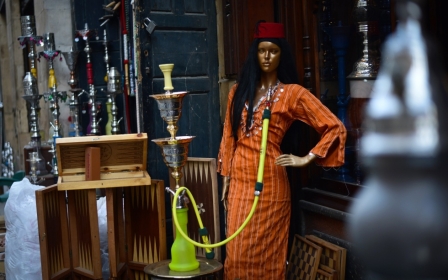'Dizziness', the super-tobacco hooking UAE teens

By Lynne al-Nahhas
Despite campaigns on the risks of smoking, teenagers in the United Arab Emirates are turning to a little-known tobacco product five times more potent than cigarettes and said to cause seizures.
Omar, an 18-year-old Sudanese student in Abu Dhabi, describes how each hit of medwakh - a legal product inhaled from a small pipe - makes him feel.
"It's a horrible habit. But if I don't do it my head hurts," he said. "I feel I need it."
Omar is not alone in smoking medwakh, which means "dizziness" in Arabic; the product is reportedly popular among young people throughout the United Arab Emirates.
One puff is enough to make the smoker light-headed, or as one 17-year-old ex-smoker who identified himself as "Clique-C" described the feeling, "relaxed".
Based on 2013 statistics from the American Cancer Society and the World Lung Foundation, 15.6 percent of male teenagers smoke tobacco daily in the UAE, as do 18.1 percent of men.
And while there are no official statistics on the use of medwakh among young people, researchers say the habit is widespread.
"We did a study in (the emirate of) Ajman on schoolchildren and we found that 36 percent of them were doing medwakh," Rizwana Burhanuddin Shaikh, associate professor at the department of community medicine at the Gulf Medical University, told AFP.
Then there is its potency.
According to Palat Menon, a researcher at the Centre for Advanced Biomedical Research and Innovation in the Gulf Medical University, each gram of medwakh contains around 44 milligrams of nicotine - the equivalent to four or five cigarettes.
'A head spin'
"In an average pipe, six milligrams of nicotine get inhaled in 15 to 20 seconds, and that is what gives you a head spin," he said.
Shereena al-Mazroui, section head of non-communicable diseases at the Abu Dhabi Health Authority, said that although little is known about the product, preliminary research suggests a link between medwakh and seizures.
"Some users, after they take the puff, they suffer from seizures, dizziness and faint," she said.
"This phenomenon has spread more within the last 10 years. The tragedy is that it has begun with children."
Medwakh is usually sold cheaply in tobacco shops and grocery stores near schools, in small glass bottles with no packaging or content details.
"Smoking medwakh is mainstream here," said Omar (not his real name).
"Almost everyone" he knows at his Abu Dhabi school smokes it, mainly the boys, he added.
Its appeal has even become international, with one Emirati expatriate family setting up a medwakh import business in the United States, according to Alan Blum, a tobacco expert at the University of Alabama.
Omar appears to know little about the tobacco he smokes three to four times a day and which leaves him dizzy for a few seconds each go.
'Spices maybe?'
Asked what he thinks it may contain, he replied: "It's tobacco with spices maybe? It's not as bad as cigarettes. I don't know if it's addictive."
His 17-year-old Lebanese classmate - Clique-C - said he stopped smoking medwakh three months ago "with the help of a close friend", after he was suspended from school for a few days.
"When I first stopped, I started getting a need to use it," he said, but now he feels "fresh and healthy".
When he smoked it, Clique-C said medwakh gave him "comfort".
"It was like a pain-reliever. It made my head feel so light."
Although some schools carry out random bag searches for medwakh, Emirati authorities appear to be looking the other way for now.
"I have many times seen cases where police cars would pass by with obviously small kids standing at the corner and smoking it," Omar said.
"But they just pass by, look at them, and don't even stop."
The teenager says he is struggling to stop smoking medwakh as "it's everywhere and legal".
"I hate myself for it," he said, fearful of what his mother might do if she found out about the habit.
"I definitely want to quit."
Middle East Eye propose une couverture et une analyse indépendantes et incomparables du Moyen-Orient, de l’Afrique du Nord et d’autres régions du monde. Pour en savoir plus sur la reprise de ce contenu et les frais qui s’appliquent, veuillez remplir ce formulaire [en anglais]. Pour en savoir plus sur MEE, cliquez ici [en anglais].




